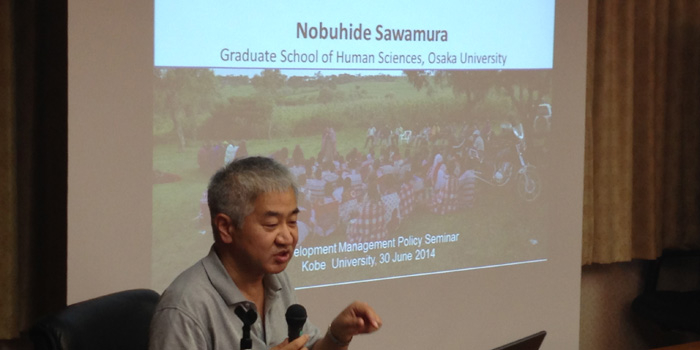Internship at ADB Headquarters (Rakibul Hassan)
From February 10th to April 25th of 2025, I had the wonderful opportunity to conduct an internship at the Asian Development Bank (ADB) headquarters in Manila, Philippines under the supervision...
Graduate School of International Cooperation Studies (GSICS), Kobe University


On Monday, June 30th, 2014, a Development Management Policy Seminar on “International Education Cooperation in the Post-2015: From Perspectives of Academia based on Field Research” was conducted in the main conference room in Kobe University’s Graduate School of International Cooperation Studies (GSICS). For this seminar, two international experts on education development were invited. One of them was Dr. Nobuhide Sawamura, professor at Department of Global Human Sciences, Graduate School of Human Sciences in Osaka University. The other speaker was Dr. James Wokadala, lecturer at Makerere University in Uganda.
 Dr. Nobuhide Sawamura gave a presentation on “Exploring the Long-term Impact of Primary Schooling in the Traditional Society of Kenya: Implications for the Post-2015 Debate”. He first introduced his field research to Women in Maasai people in Kenya and talked about the impacts of qualitative research by introducing the outcomes of his research. He also mentioned new goals and achievements for the Post-2030 discussed at Muscat conference in Oman in May.
Dr. Nobuhide Sawamura gave a presentation on “Exploring the Long-term Impact of Primary Schooling in the Traditional Society of Kenya: Implications for the Post-2015 Debate”. He first introduced his field research to Women in Maasai people in Kenya and talked about the impacts of qualitative research by introducing the outcomes of his research. He also mentioned new goals and achievements for the Post-2030 discussed at Muscat conference in Oman in May.


 Dr. James Wokadala presented about the teacher training evaluation project in Myanmar conducted by Dr. Keiichi Ogawa after Dr. Ogawa’s brief introduction. In addition to the teacher training system in Myanmar, he explained the financial and management issues of the system and talked about some suggestions. Also, a joint researcher, Mr. Jeje Okurut, a senior policy planner, now is a doctoral student in GSICS also talked about the importance of infrastructure and ICT to education by giving examples. He concluded that financial mobilizations is one of the essential factors for the teacher training system in Myamar.
Dr. James Wokadala presented about the teacher training evaluation project in Myanmar conducted by Dr. Keiichi Ogawa after Dr. Ogawa’s brief introduction. In addition to the teacher training system in Myanmar, he explained the financial and management issues of the system and talked about some suggestions. Also, a joint researcher, Mr. Jeje Okurut, a senior policy planner, now is a doctoral student in GSICS also talked about the importance of infrastructure and ICT to education by giving examples. He concluded that financial mobilizations is one of the essential factors for the teacher training system in Myamar.
 To conclude the seminar, Mr. Joseph Adomako, director at Ministry of Education in Ghana, and Mr. Chifundo Evance Kazembe, planning officer at Ministry of Education, Science & Technology in Malawi provided their comments. Mr. Adomako emphasized the importance of ICT for education development and he pointed out the need of improvement of teacher environment by comparing Ghana and other countries. Mr.Chifundo pointed out the women’s drop-out rate in Kenya in Dr. Sawamura’s case study in Maasai people and introduced the reality of women education where they still have a difficulty for assuring access to education for female in Malawi.
To conclude the seminar, Mr. Joseph Adomako, director at Ministry of Education in Ghana, and Mr. Chifundo Evance Kazembe, planning officer at Ministry of Education, Science & Technology in Malawi provided their comments. Mr. Adomako emphasized the importance of ICT for education development and he pointed out the need of improvement of teacher environment by comparing Ghana and other countries. Mr.Chifundo pointed out the women’s drop-out rate in Kenya in Dr. Sawamura’s case study in Maasai people and introduced the reality of women education where they still have a difficulty for assuring access to education for female in Malawi.
In the Q&A time, we had a very energetic discussion with lots of questions and comments to the lecturers and also to the commentators. This was an extremely valuable opportunity to learn the significance of the field research for international education cooperation from the great lecturers with their rich experiences.
Related link:
http://www.kobe-u.ac.jp/en/NEWS/event/e2014_06_30_01.html